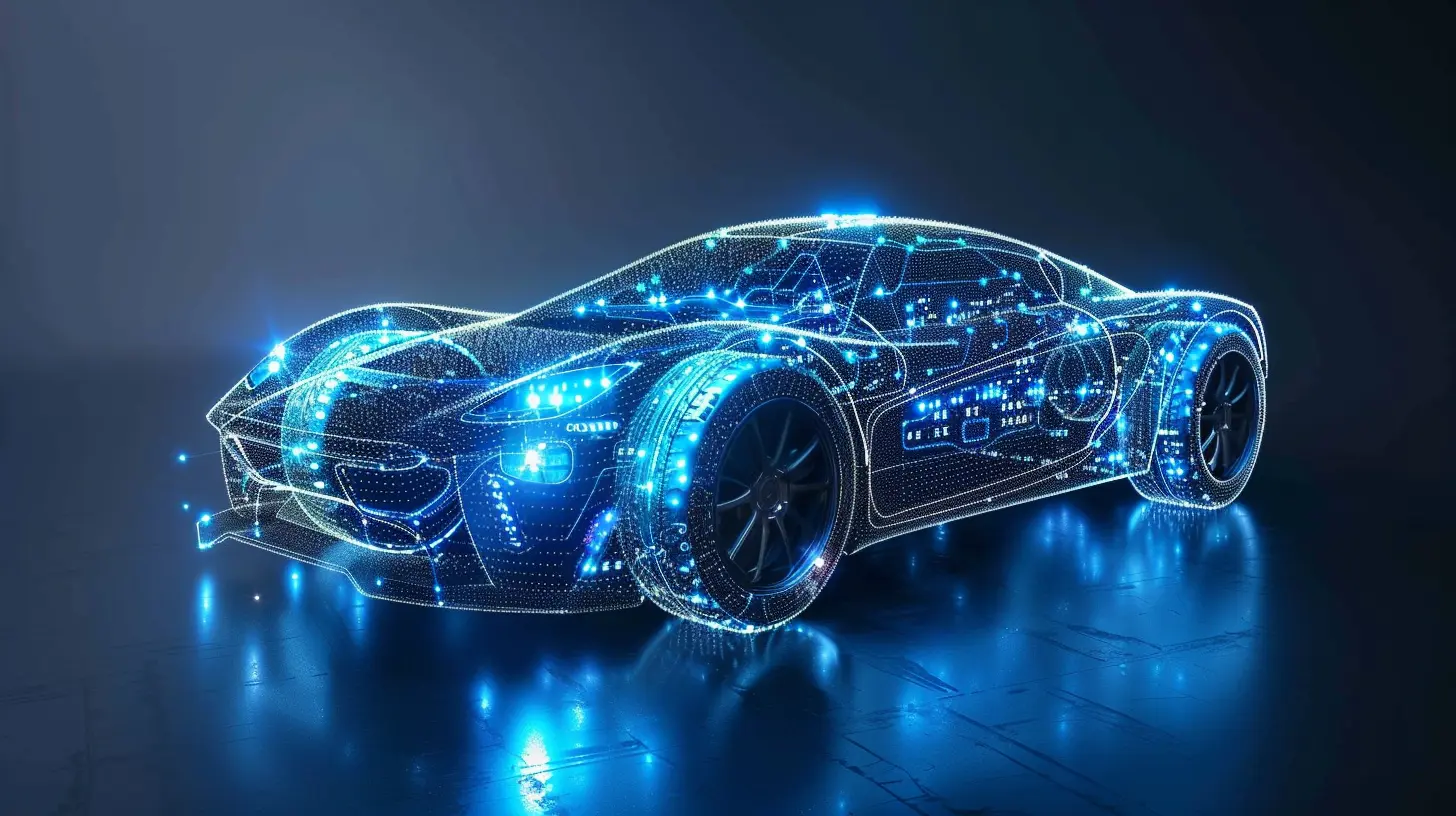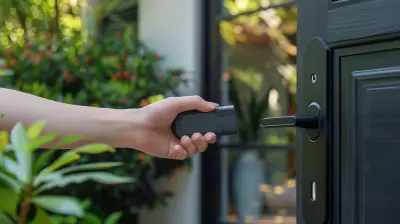The Role of Blockchain in Securing Autonomous Vehicle Networks
18 July 2025
Autonomous vehicles are no longer just a futuristic concept. With companies like Tesla, Waymo, and Uber investing heavily in self-driving technology, it’s clear that autonomous vehicles (AVs) are on the fast track to becoming a regular part of our transportation system. But as with any emerging tech, there’s a big elephant in the room—security.
Think about it. These vehicles are essentially computers on wheels, and they rely heavily on complex networks to communicate with each other, infrastructure, and even us, the users. While that’s super cool, it also makes them vulnerable to cyberattacks. This is where blockchain, a technology primarily known for powering cryptocurrencies like Bitcoin, steps in as a potential game-changer.
In this article, we’re going to dive deep into the role of blockchain in securing autonomous vehicle networks. If you’re curious about how these two technologies intersect and why it matters, you’re in the right place!

What Are Autonomous Vehicle Networks?
Before we get into blockchain, let’s take a step back and understand what we mean by "autonomous vehicle networks." These networks are essentially the communication systems that allow self-driving cars to interact with each other, share data, and make real-time decisions.How Do Autonomous Vehicles Communicate?
Autonomous vehicles rely on a mix of sensors, cameras, radar, and AI to perceive their environment. But they don’t just operate in isolation. They communicate with other vehicles, traffic lights, and even pedestrians through Vehicle-to-Everything (V2X) technology. This allows them to share crucial data like:- Traffic conditions: If a car ahead encounters a traffic jam, it can inform the cars behind it.
- Road hazards: Noticing a pothole? The vehicle can notify others approaching the same area.
- Weather conditions: If the road is slippery, vehicles can share this info and adjust accordingly.
All of this sounds great, right? But here’s the kicker—such a robust network can also be a hacker’s playground if not adequately secured. That’s where blockchain technology comes in.

Why Do Autonomous Vehicle Networks Need Blockchain?
So, why blockchain? Isn’t it just for Bitcoin and Dogecoin? Not exactly.Blockchain is a decentralized ledger technology that records transactions in a way that’s transparent, secure, and nearly impossible to tamper with. In a world where data breaches and hacking attempts are a daily occurrence, blockchain offers a level of security that traditional systems simply can’t match.
The Vulnerabilities in Autonomous Vehicle Networks
Autonomous vehicle networks, by their very nature, are vulnerable to a slew of cyberattacks. Some potential risks include:- Data breaches: Hackers could intercept communication between vehicles and manipulate data.
- Spoofing attacks: Cybercriminals might impersonate other vehicles to send fake signals, causing accidents.
- Denial of Service (DoS): Flooding the network with traffic, rendering the system unusable.
With such high stakes, securing these networks is paramount. A compromised autonomous vehicle network doesn’t just mean stolen data—it could mean human lives are at risk.
Enter Blockchain: The Security Saviour
Blockchain can mitigate many of these vulnerabilities. Here’s how:- Decentralization: Unlike traditional centralized systems, blockchain doesn’t rely on a single point of failure. Even if one node is compromised, the rest of the network remains secure.
- Immutability: Once data is recorded on a blockchain, it can’t be altered or deleted. This ensures that no one can tamper with the data exchanged between autonomous vehicles.
- Transparency: Blockchain's transparent nature allows all participants in the network to verify the authenticity of the data being shared. This makes it much harder for hackers to slip in false information.
- Smart Contracts: These are self-executing contracts where the terms of the agreement are written directly into code. In the context of autonomous vehicles, smart contracts could automatically execute actions like payments, data-sharing agreements, or even insurance claims, without the need for third-party intervention.

How Blockchain Enhances Communication and Data Integrity
One of the most critical areas where blockchain can help autonomous vehicles is in ensuring that the data exchanged between them is accurate and trustworthy. With thousands of vehicles sharing data in real-time, errors or malicious data can be catastrophic.Data Integrity and Verification
Blockchain can establish a system where each transaction or communication between vehicles is verified by multiple nodes before it’s accepted as valid. This means that if one vehicle tries to send false data, the rest of the network will reject it.Imagine blockchain as a group of friends who always fact-check each other. If one friend tries to spread a rumor, the rest of the group will call them out. In the same way, blockchain ensures that only verified information gets passed around in the autonomous vehicle network.
Preventing Man-in-the-Middle Attacks
In a traditional network, a hacker could potentially intercept communication between two vehicles and alter the data being sent. This is what’s known as a "man-in-the-middle" attack. Blockchain’s decentralized nature makes this kind of attack much harder. Since each transaction needs to be verified by multiple nodes, it’s nearly impossible for a hacker to alter the data without being detected.
Boosting Trust and Privacy Between Vehicles
One of the ongoing challenges in autonomous vehicle networks is the issue of trust. How do you know that the vehicle next to you is sending accurate data? And more importantly, how do you ensure that your personal data isn’t being misused?Blockchain and Trustless Systems
Blockchain operates on a "trustless" system, which might sound ironic, but it’s actually a good thing. It means that participants in the network don’t need to trust each other—because the system itself ensures that everything is above board.In an autonomous vehicle network, this means that vehicles can share crucial data (like traffic conditions, road hazards, etc.) without worrying about the source of the data. With blockchain, the data is verified and secure, regardless of where it’s coming from.
Privacy Concerns and Data Ownership
Another big advantage of blockchain is that it can provide better privacy controls. Traditional systems often require users to hand over personal data to a central authority, which can then store or even sell that data. With blockchain, you retain control over your data. You can decide who gets access to it and under what conditions.This is particularly important in the context of autonomous vehicles, where sensitive data like your location, driving habits, and even biometric information could be at risk.
Blockchain-Powered Autonomous Fleets
We’ve talked a lot about individual vehicles, but blockchain can also play a significant role in managing entire fleets of autonomous vehicles. Think about ride-hailing services like Uber or Lyft. In the future, these companies could operate fleets of autonomous vehicles, and blockchain could help manage everything from vehicle maintenance to payments.Fleet Management and Maintenance
With blockchain, every action that a vehicle takes—whether it’s picking up a passenger, getting serviced, or even refueling—can be recorded on an immutable ledger. This creates a transparent and auditable record of the vehicle’s history, making it easier to manage large fleets and ensure that everything is running smoothly.Autonomous Ride-Hailing Payments
Blockchain’s smart contracts could also streamline payments in ride-hailing services. Imagine booking an autonomous Uber, and the payment is automatically processed through a blockchain-based smart contract the moment you reach your destination. No need for third-party payment processors, and the transaction is secure and transparent.
Challenges and Limitations of Blockchain in Autonomous Vehicle Networks
Of course, like any technology, blockchain isn’t without its challenges. While it offers a lot of promise for securing autonomous vehicle networks, it’s not a silver bullet.Scalability Issues
One of the biggest challenges with blockchain is scalability. Traditional blockchains, like Bitcoin and Ethereum, struggle with processing large numbers of transactions quickly. Autonomous vehicle networks will need to handle vast amounts of data in real-time, and current blockchain technology may not be up to the task just yet. However, solutions like Layer 2 scaling and sharding are being explored to address this issue.Energy Consumption
Another challenge is that blockchain, particularly Proof of Work (PoW) systems, can be highly energy-intensive. Given the push for more eco-friendly technologies, this could be a significant disadvantage. That said, newer consensus mechanisms like Proof of Stake (PoS) are more energy-efficient and could be a better fit for autonomous vehicle networks.The Future of Blockchain and Autonomous Vehicles
Despite these challenges, the potential for blockchain to revolutionize security in autonomous vehicle networks is enormous. As both industries continue to evolve, we can expect to see more collaboration between the two. Blockchain could very well become the backbone of a secure, efficient, and transparent autonomous vehicle ecosystem.In the near future, we might see blockchain being used for everything from securing vehicle-to-vehicle communication to managing entire fleets of autonomous ride-hailing services. The possibilities are endless.
Conclusion
In a world where autonomous vehicles are becoming an integral part of our lives, the need for secure, trustworthy communication networks is more important than ever. Blockchain, with its decentralized and tamper-proof nature, offers a compelling solution to many of the security challenges facing autonomous vehicle networks today.While the technology is still evolving, its potential to enhance data integrity, boost trust, and streamline operations is undeniable. As both blockchain and autonomous vehicle technologies continue to advance, we can expect to see them working hand in hand to create a safer, more efficient transportation system.
all images in this post were generated using AI tools
Category:
Autonomous VehiclesAuthor:

John Peterson
Discussion
rate this article
2 comments
Zephyrwind White
Exciting times ahead! Blockchain's potential to enhance security in autonomous vehicle networks paves the way for safer roads and innovations. Embracing this technology will undoubtedly transform our mobility landscape and inspire trust in the future of transportation!
November 21, 2025 at 5:22 AM

John Peterson
Thank you for your enthusiasm! Indeed, blockchain has the potential to significantly enhance security and trust in autonomous vehicle networks, paving the way for a safer and more innovative future in transportation.
Emmeline McGowan
Great insights on how blockchain can enhance security in autonomous vehicle networks. This technology could be pivotal for future safety and efficiency.
July 18, 2025 at 11:48 AM

John Peterson
Thank you! I'm glad you found the insights valuable. Blockchain's potential in enhancing safety and efficiency is indeed exciting for the future of autonomous vehicles.


